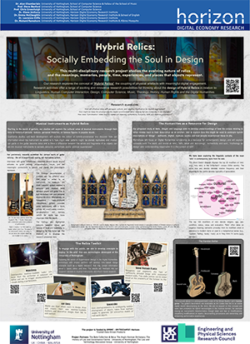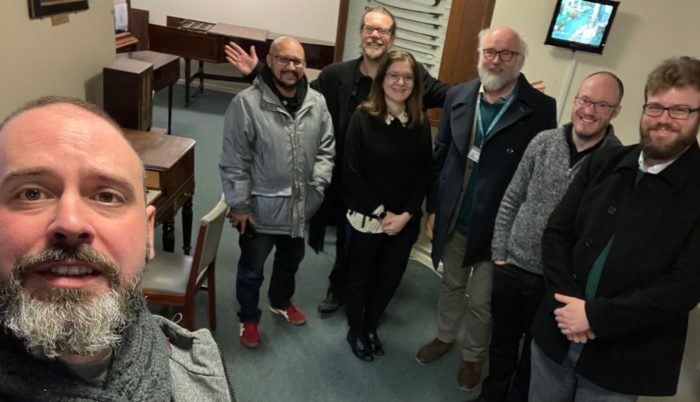05
02
.24
Hybrid Relics Project visits the University of Oxford: AI, Artefacts, Collections & Archives – mid blog
Written by Dr Alan Chamberlain (Principal Investigator)
On the 30th of November 2023, the Hybrid Relics team attended Horizon’s ‘Away Day and Advisory Board Meeting’ at the Park Plaza in Nottingham. As part of the event, we produced the poster below which enabled us to start to talk to people about the project and to get some feedback on our ideas.

A key part of the project was working with our partners at the Bate Collection. I had previously visited Dr Emanuela Vai (Keeper of the Bate Collection) to discuss a joint project with a focus on Sensory Heritage in the context of the Humanities, Dr Vai had also kindly agreed to co-chair a symposium, along with Prof Dave De Roure and myself at the University of Oxford: Music and the Internet of Things: Physical Computing, Creativity, and Sensory Heritage. A great outcome of this was the development of a partnership to start looking at issues relating to the use of different technology-based approaches to exploring the Bate Collection.
In January we organised a workshop at the Bate Collection in Oxford to prioritise and focus on areas of research and plan future events. Part of this workshop was to develop and co-design an approach to enable us to connect and engage with a wide range of people who could take part in our research at a future event.
One area of research that had been previously discussed was the representation of artefacts and relics in the collection. How might we enable different stakeholders to engage with the instruments in the collection in a more personalised, meaningful, reflective way – and could alternative curation be created that related back to the collection, or that acted as a catalyst to enable curators, and other users of the collection to ‘re-frame’ the artefacts? Artefacts in the one collection might even link to other collections, times, people and locations. An emergent area of this research has also been our developing understanding of Heritage and Wellbeing (which we are developing with more partners for stage II of the project) – as highlighted in this UNESCO report.
The workshop was attended by Prof Dave De Roure (Head of Digital Scholarship – Uni Oxford), Dr Emanuela Vai (Keeper of the Bate Collection, Faculty of Music – Uni Oxford), Dr Andrew Cusworth (Bodleian Library – Uni of Oxford), Dr Alan Chamberlain (PI Principal Investigator (Nottingham), Dr Glenn McGarry (Uni of Nottingham) and Dr Richard Ramchurn (Uni of Nottingham) and Dr Oliver Butler (Uni of Nottingham – Law).

L to R – Glenn, Richard, Alan, Emanuela, Dave, Andrew & Oliver (Bate Collection)
During the workshop I presented a framework that formed the basis of a practical way to start to look at the notion of hybridity (digital/physical) and how we might use generative AI tools to re-imagine and reframe a range of different understandings about the collection. I am now in the process of writing up the framework as a research paper, we used the title: ReFraming Relics: Hybrid Experimental Digital Humanities Approaches to AI and Archives in our workshop.
As part of the session, we used Miro to map out ideas based around the framework. This helped shape where we aim to go in the future. A key part of this is based in the use of generative AI tools to start to re-frame and use the Bate Collection as a catalyst to prompt people to add their own generated images and text to the collection. This in turn becomes another representation and helps us to understand the hybrid nature of these relationships between digital and physical objects. We want to go beyond the material nature of the artefact i.e. the material it is built from and obvious characteristics, to encourage people to reflect on the personal meaning that things have in the world.
Prior to the workshop Dr McGarry visited several locations in Oxford – the Ashmolean Museum, Pitt Rivers Museum and the Bodleian Library, to start looking at ways in which things in those settings were curated. Dr Ramchurn was able to offer useful insight into the tools that can support these sorts of engagements, while Dr Butler was able to direct discussion and unpack issues relating to governance and law – an area of particular importance when considering identity and responsible innovation. The literature suggests that there is a link between cultural identity and wellbeing, so we are keen to further understand this.
We are now planning another workshop in Oxford. Dr Ramchurn and Dr McGarry are busy pulling resources together to practically run an event, which will mean that, with our colleagues at Oxford University, we can start to develop further understandings in this area, grow our network and write future funding proposals.
As the project has started to develop and use an AI-based approach, we have linked up with some other programmes and projects working in this area; the Responsible Research and Innovation cross cutting theme introduced by Horizon Digital Economy Research (hoRRIzon 1, 2 and 3.), the Trustworthy Autonomous Systems Responsible Research and Innovation theme (II) and the Responsible AI (RAI) UK ‘Responsible Innovation Advantage in Knowledge Exchange RAKE project. In doing this we can deliver more impactful outcomes.
Keep your eye out for our next blog which talks about other meetings we have had, that have started to inform our understanding of the interplay of religious relics, faith, and technology – another area which Dr Butler and I have been researching. A topic of research where it is important to think about the interplay of technology (AI), law, governance, and belief.
Read more about the Hybrid Relics project here.




Tags:
AI,
Artificial Intelligence,
Bate Collection,
digital humanities,
hybrid


















